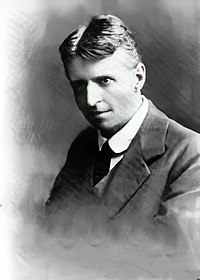Otto Gross
| Otto Gross | |
|---|---|
 |
|
| Born | Otto Hans Adolf Gross 17 March 1877 Gniebing-Weißenbach, Austro-Hungarian Empire |
| Died | 13 February 1920 (aged 42) Berlin, Germany |
| Fields | Psychoanalysis |
| Influences | Sigmund Freud, Max Stirner, Friedrich Nietzsche, Peter Kropotkin, Wilhelm Reich |
| Influenced | Carl Jung, D. H. Lawrence, Franz Kafka |
Otto Hans Adolf Gross (17 March 1877 – 13 February 1920) was an Austrian psychoanalyst. A maverick early disciple of Sigmund Freud, he later became an anarchist and joined the utopian Ascona community.
His father Hans Gross was a judge turned pioneering criminologist. Otto initially collaborated with him, and then turned against his determinist ideas on character.
A champion of an early form of anti-psychiatry and sexual liberation, he also developed an anarchist form of depth psychology (which rejected the civilising necessity of psychological repression proposed by Freud). He adopted a modified form of the proto-feminist and neo-pagan theories of Johann Jakob Bachofen, with which he attempted to return civilization to a 'golden age' of non-hierarchy. Gross was ostracized from the larger psychoanalytic movement, and was not included in histories of the psychoanalytic and psychiatric establishments. He died in poverty.
Greatly influenced by the philosophy of Max Stirner and Friedrich Nietzsche and the political theories of Peter Kropotkin, he in turn influenced D. H. Lawrence (through Gross's affair with Frieda von Richthofen), Franz Kafka and other artists, including Franz Jung and other founders of Berlin Dada. His influence on psychology was more limited. Carl Jung claimed his entire worldview changed when he attempted to analyse Gross and partially had the tables turned on him.
...
Wikipedia
